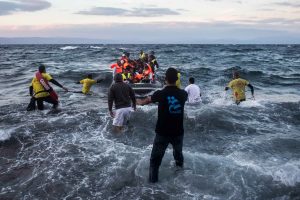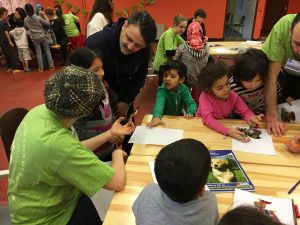“If you are being pulled off a boat after several hours on the ocean, you don’t care if the person carrying you is a Jew or a Muslim”, says a spokesman of IsraAID, Israel’s leading humanitarian non-governmental organization. As well as helping in the current refugee crisis – also in Germany – IsraAID provides first-response emergency relief and long-term support worldwide…

(c) Israaid http://www.israaid.co.il/ (
Muhammad Ali had many faces. Professional boxer and American Olympian. Black rights activist, admirer as well as opponent of Malcolm X. Humanitarian, rapper, poet, writer. Member of the Nation of Islam and devout Muslim, constantly “ready to meet God” as he put it in 1977 during an interview in the United Kingdom. As one of the most celebrated, most versatile sports figures of the 20th century, Ali is remembered for many things, including his efforts as a social activist. Among his greatest philanthropic accomplishments was the foundation of the multicultural Muhammad Ali Center, a charity fund and museum devoted to humanitarian projects the sportsman carried out during his lifetime. Since 2013, the fund awards and celebrates social contributions from around the world that have proven to pay tribute to Ali’s values and actions. During an annual awards ceremony, hosted in Ali’s hometown Louisville in Kentucky, the Muhammad Ali Humanitarian Awards publicly recognize outstanding individuals who pass on and keep the athlete’s legacy alive.
This year, Navonel Glick, chief operating officer of the Israeli non-governmental organization IsraAID, has been selected to receive the praise at the center’s recent annual gala dinner. Glick was among five other young professionals, age thirty and under, who have been serving as advocates for positive change in the world and as role models that might ultimately transform communities for the better. The six winners are supposed to represent Muhammad Ali’s six core principles of Confidence, Conviction, Dedication, Giving, Respect, and Spirituality.
Global disaster-response missions
Prior to his current role, Glick served as IsraAID’s programs director, leading disaster-response missions across the world, including the Philippines after Typhoon Haiyan, Sierra Leone after the Ebola outbreak, and Northern Iraq since the emergence of the Islamic State. With IsraAID, Glick is working for Israel’s leading humanitarian non-governmental organization, being committed to providing first-response emergency relief and durable solutions for populations affected by natural disasters, epidemics, and post-conflict situations. In one decade, the initiative has responded to numerous crises in 35 countries and trained more than 5000 local professionals as well as international volunteers. Since its inception in 2001, IsraAID has become synonymous with rapid, immediate, and life-saving emergency assistance in the first instant when a humanitarian crisis occurs. In addition to this first response crisis relief, the non-governmental organization has expanded its capacities in the field of long term support, currently trying to offer relief in the refugee crisis taking place in Germany. “Our efforts in the on-going refugee crisis initially started in Greece, mostly on the island of Lesbos, and in the border regions of the Balkans. But we quickly understood that Germany will have to assemble great manpower in order to deal with such a high influx of refugees and is still lacking professionals in specific fields,” says Mickey Noam-Alon, Media Director and Emergency Team Leader at IsraAID. In 2015 alone, more than one million asylum seekers made the journey from war and starvation seeking refuge in Germany. The vast majority arrived from Syria, Iraq, and Afghanistan, with 80% of them under the age of 35 and with about one in five of them children. “This is a massive challenge for the German government and society to address,” continues Noam Alon, “IsraAID has thus agreed to send professional support. A lot of the people we chose are Arabic native speakers who are desperately needed to fill the current gap of miscommunication and to assure efficient bureaucratic processes.”
Relief in Germany’s refugee crisis

(c) Israaid http://www.israaid.co.il/ (
In 2015, IsraAID responded to the request of the German government by deploying a team of Arabic and English speaking psychosocial specialists to help support the refugee resettlement. In cooperation with representatives of both the local government and the Federal Ministry of Health, local NGOs, Muslim and Jewish community organizations, the organisation quickly established a net-work of well-trained professionals and volunteers. “The NGO’s main concern is both psychological first aid for asylum seekers as well as stress management training and peer supervision for aid workers,” says Noam-Alon. Since April 2016, IsraAID has been instructing aid workers and volunteers with their Mobile Swpecialist Trauma Unit. Psychologists have been visiting refugee shelters in Berlin and Hanover and reporting to the German government and to local NGOs specialised in mental health. Additionally, IsraAID offers tools to combat gender-based violence for local volunteers, counselors, and other key stakeholders in order to address issues of cultural differences and mistreatment in refugee camps. Right now, IsraAID’s members are preparing long-term sustainable support for ten different shelters all over Germany, focusing on hot spots, such as Berlin, Frankfurt, and Brandenburg with a total of 9,500 refugees.
The fact that a high amount of refugees are of Muslim faith apparently is of no concern, according to Noam-Alon: “We have not had any negative experience assisting refugees of Muslim belief while being an Israeli NGO. Or let me put it this way: If you are being pulled off a boat after several hours on the ocean and in constant fear of death, you do not care if the person carrying you is a Jew or a Muslim.” Noam-Alon believes that IsraAID’s involvement in the refugee crisis in Germany could possibly facilitate peace processes among the nations and faiths. According to the NGO’s official statement, it could “become a game changer and serve as a key component in building trust and relations between Jews, Muslims, and Christians, Israelis, Germans, and Syrians, and by doing so reduce both anti-Semitism and Islamophobia.” Probably just like Muhammad Ali would have wanted it. Or as he once said: “Service to others is the rent you pay for your room here on earth.”
